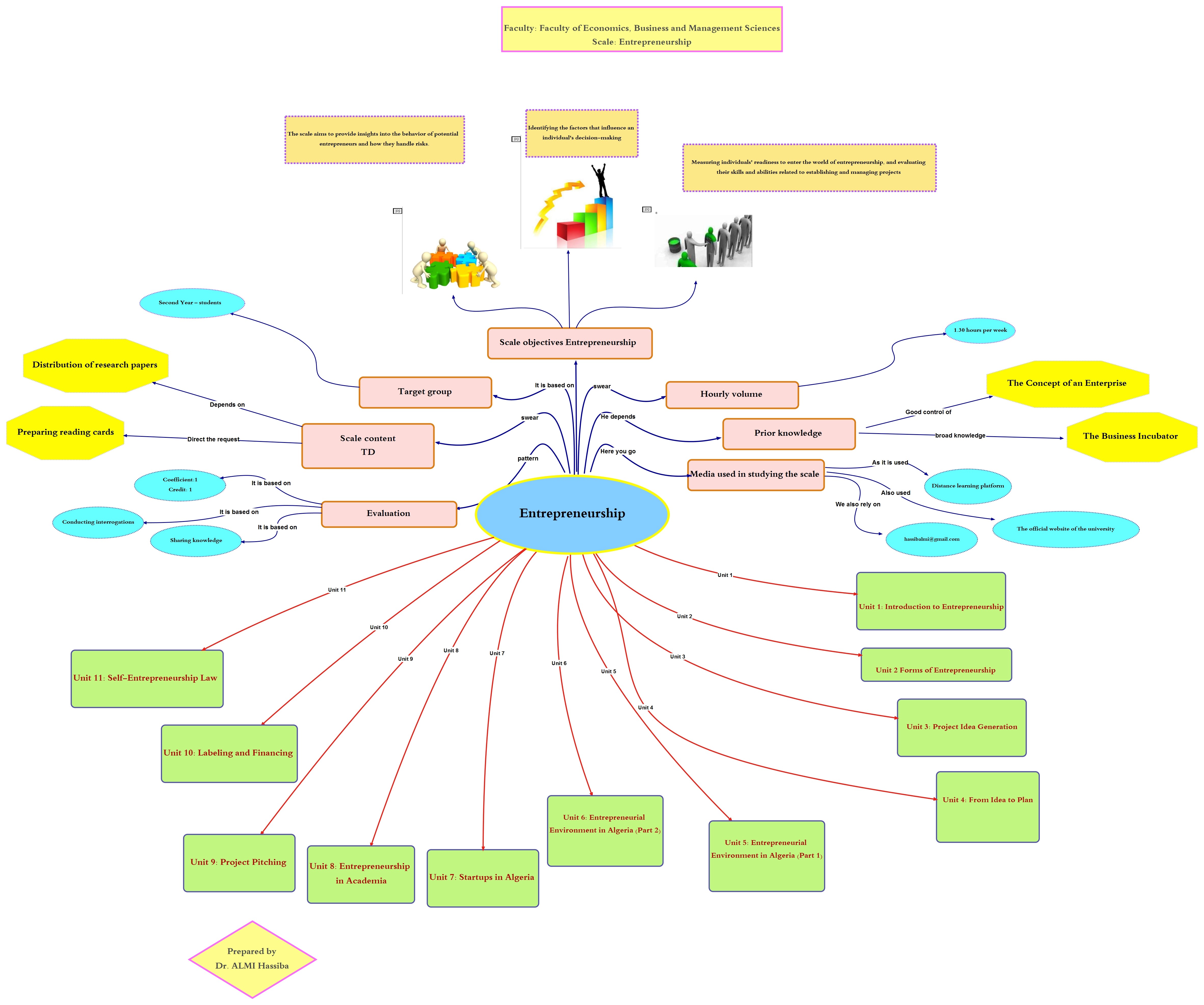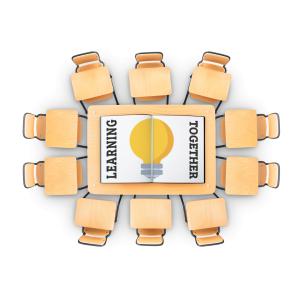Topic outline
General
Identification of the Teaching Subject
-
University: Badji Mokhtar University, Annaba
-
Faculty: Economic Sciences, Commercial Sciences, and Management Sciences
-
Department: Economic Sciences
-
Level: Second-Year Bachelor's Degree (Licence)
-
Specialty: Economic Sciences
-
Semester: Fourth
-
Academic Year: 2024/2025
-
Module Name: Entrepreneurship
-
Teaching Unit: Exploratory
-
Credits: 1
-
Coefficient: 1
-
Weekly Lecture Hours: 1.5 hours
-
Total Semester Hours: 22.5 hours
-
Instructor: Dr. Almi Hassiba, Assistant Professor "MCB"
-
Contact Email: hassibalmi@gmail.com/ hassiba.almi@univ-annaba.dz
-
Office Location: Office 47
-
Office Hours: Thursdays, 8:00 AM - 11:00 AM
-
- The Entrepreneurship course, designed for second-year economic sciences students, aims to initiate them into the world of entrepreneurship. The course content covers key concepts, the process of establishing entrepreneurial projects, and the supporting environment in Algeria, including start-ups and financing institutions.

-
Name, Grade: Dr. Almi Hassiba, Assistant Professor "MCB"
-
Office Location: Office 47, Department of Economic Sciences
-
Email: hassibalmi@gmail.com / hassiba.almi@univ-annaba.dz
-
Course Time and Place: Thursdays, 8:00 AM - 11:00 AM, Classroom 29
-
E-Learning Platform: https://elearning-facsceg.univ-annaba.dz/course/view.php?id=676
-
-
Declaration and Syllabus
Declaration form concerning the commitment to adhere to ethical standards and professional conduct for remote learning.

This Syllabus is for second-year students, Department of Economic Sciences.
Space of communication
This forum is for second-year students in the Department of Economic Sciences.
🗣️ Welcome to the Discussion Forum – Entrepreneurship Course
Dear Students,
Welcome to the official forum of our Entrepreneurship course (S2 – 2nd Year, Economic Sciences).
This space is designed to foster collaborative learning, discussion, and knowledge sharing. Here, you can:
✅ Ask questions related to lectures, concepts, and weekly units
✅ Share your ideas, thoughts, or reflections on entrepreneurship
✅ Engage in peer-to-peer learning and support each other
✅ Discuss assignments, projects, and pitch preparations
✅ Receive announcements and responses from your instructor📌 Forum Guidelines
Be respectful and constructive in your comments.Always title your message clearly (e.g., “Question about Unit 3: Idea Generation”).
Try to search before posting a question—someone may have already asked it.
Keep messages relevant to the course material.
Use English as the main language to ensure everyone benefits equally.
💬 Weekly Question to Start:
What does entrepreneurship mean to you personally?
Reply to this thread and share your thoughts in a few sentences!Looking forward to a semester full of creativity, innovation, and entrepreneurial spirit!
Warm regards,
Dr. Almi Hassiba
[ hassibalmi@gmail.com ]Important Announcement for Entrepreneurship Students
Dear students,
Please be informed that there will be an interactive session via Google Meet to discuss course topics and answer your questions.
Date and Time: Every Thursday, from 17:00 to 18:30
Join Link: https://meet.google.com/yzm-uqcp-mxcThis session is an excellent opportunity for direct interaction and to ask questions. We look forward to your active participation!

Learning Objectives

The general objective of this subject:
Learning Objectives Upon successful completion of this course, students should be able to:
- Understand and explain the fundamental concepts of entrepreneurship.
- Identify and analyze the characteristics and behaviors of successful entrepreneurs.
- Develop a business model for a potential entrepreneurial venture.
- Apply theoretical knowledge to real-world entrepreneurial scenarios, particularly within the Algerian context.
Course Units
Welcome to the Entrepreneurship Module!
This comprehensive module is designed to guide you through the dynamic world of entrepreneurship, from foundational concepts to practical application, with a specific focus on the unique entrepreneurial landscape in Algeria. Each unit is structured to provide clear, actionable insights and build your understanding progressively.

Unit 1: Introduction to Entrepreneurship
This foundational unit defines entrepreneurship, explores its historical roots, and highlights its crucial roles in society.
-
Definitions: Understanding various definitions of entrepreneurship, including insights from the Global Entrepreneurship Monitor (GEM).
-
Historical Evolution: Tracing the journey of entrepreneurship through different eras.
-
Dimensions: Exploring the core elements of entrepreneurship: Creativity, Innovation, and Risk-taking.
-
Roles of Entrepreneurship: Understanding its significant economic, social, and environmental impact.
Unit 2: Forms of Entrepreneurship
Beyond starting from scratch, entrepreneurship takes various forms. This unit explores different pathways to becoming an entrepreneur.
-
Creating a New Enterprise: The classic approach of launching a brand-new business.
-
Buying an Existing Business: The advantages and considerations of acquiring an established venture.
-
Intrapreneurship: Fostering an entrepreneurial spirit and innovation within an existing organization.
Unit 3: Project Idea Generation
Every successful venture begins with a compelling idea. This unit will equip you with systematic strategies to generate viable business concepts.
-
Methods, Sources, and Phases: Learning effective methods for idea generation, identifying potential sources of inspiration, and understanding the phases of developing an initial concept.
Unit 4: From Idea to Plan
Once you have a promising idea, the next step is to transform it into a concrete, actionable plan. This unit focuses on structuring your vision.
-
Business Model Canvas (BMC): A powerful strategic management tool for visualizing and developing new or existing business models.
-
Business Plan: Crafting a detailed roadmap that outlines your business goals, strategies, and financial projections.
Unit 5: Entrepreneurial Environment in Algeria (Part 1)
This unit begins our exploration of the specific ecosystem supporting entrepreneurship within Algeria, focusing on the foundational support structures.
-
Support structures: Definition, tasks, and stages of various support structures available to Algerian entrepreneurs.
Unit 6: Entrepreneurial Environment in Algeria (Part 2)
Continuing our focus on the Algerian context, this unit delves into the crucial aspect of financing for entrepreneurial ventures.
-
Financing institutions: A detailed look at key Algerian financing bodies such as ANSEJ, ANGEM, CNAC, and others that provide funding opportunities.
Unit 7: Startups in Algeria
The startup scene is a dynamic and rapidly growing segment of the entrepreneurial landscape. This unit specifically examines startups within the Algerian context.
-
Characteristics, distinctions, success factors, obstacles: Understanding what defines a startup, how it differs from traditional businesses, and what contributes to its success or presents significant challenges.
Unit 8: Entrepreneurship in Academia
Universities and academic institutions play a vital role in fostering entrepreneurship. This unit explores how academia contributes to the entrepreneurial ecosystem in Algeria.
-
Education, incubation centers, CATI, BLUE, decision 1275: Examining the role of entrepreneurial education, university-affiliated incubation centers, and key initiatives like CATI, BLUE, and the impact of Decision 1275 on academic entrepreneurship.
Unit 9: Project Pitching
Effectively presenting your project idea is critical for gaining support, attracting partners, and securing investment. This unit focuses on the art of the pitch.
-
Structure and presentation techniques: Mastering how to structure your pitch for maximum impact and utilizing effective presentation techniques to captivate your audience.
Unit 10: Labeling and Financing
This unit delves into the formal recognition and further funding avenues available for entrepreneurial projects in Algeria.
-
Start-up and patent labeling, Algeria Venture, ASF: Exploring the process of obtaining official startup and patent labels, and learning about key financing mechanisms and funds like Algeria Venture and ASF.
Unit 11: Self-Entrepreneurship Law
Understanding the legal framework for individual entrepreneurs is crucial for navigating the regulatory landscape.
-
Self-Entrepreneurship Law: A deep dive into the legal provisions and regulations governing self-employment and individual entrepreneurial activities in Algeria.
-
Prerequisite
Students must have completed the Licence lessons. They should have developed a strong understanding of the basic concepts related to their fields of expertise, namely, Economics, Trade, Accounting, Management, and Finance, and improved their verbal communication skills.
Before starting this quiz, please make sure you have completed your Licence-level lessons. A solid understanding of key concepts in Economics, Trade, Accounting, Management, and Finance is essential for your success.
💡 This quiz is designed to help you activate your prior knowledge and prepare you for the advanced topics of the Entrepreneurship module.
If you don’t pass on your first attempt — don’t worry! Use this opportunity to refresh your knowledge and try again.
Recommended Resources for Review:
-
📘 Your Licence-year textbooks and notes
-
📄 Summary handouts from previous semesters
-
🎥 YouTube channels like or Investopedia for concept reviews
-
📚 Glossaries and definitions provided in this course
-
🗣️ Forums: Ask questions or seek clarification from your peers and your teacher
Stay motivated and keep learning — this quiz is just the beginning of your entrepreneurial journey!
Warm wishes,
Dr. Hassiba Almi-
Learning Unit 1: Introduction to Entrepreneurship
This unit is the cornerstone for understanding the world of entrepreneurship. It will introduce us to the nature of entrepreneurship, its historical roots, its core dimensions, and its vital role in contemporary societies across economic, social, and environmental levels.

Learning Objectives of the Unit
🎯 Upon completion of this unit, students will be able to:
-
Define entrepreneurship and its historical development.
-
Identify and explain its core elements (creativity, innovation, risk-taking).
-
Recognize its economic, social, and environmental roles.
-
Analyze its impact on growth and sustainable development.
-
Evaluate different definitions and practical examples.
-
📥 Don’t forget to download and read this lesson! It’s essential for understanding the unit and completing the related quizzes and activities. 📌 Each lesson brings you one step closer to your goal—keep going, you’ve got this! 💪

This glossary contains essential terms and definitions introduced in Unit 1: Introduction to Entrepreneurship.
🧠 Use it to:
-
Understand key entrepreneurial vocabulary
-
Reinforce your learning of concepts like creativity, innovation, risk-taking, and the historical evolution of entrepreneurship
-
Prepare for quizzes and assignments
-

T
This video offers a concise explanation of entrepreneurship, highlighting its definitions, characteristics, and importance in today’s world.

"Entrepreneurship: Concepts, Theories, and Applications" serves as a comprehensive guide to the multifaceted field of entrepreneurship. The book aims to provide a clear "map" of the most critical issues in entrepreneurship, distinguishing between established consensuses and ongoing debates within the academic community.
It is typically structured into three main parts:
-
Concepts: This section lays the groundwork by defining key terminology, exploring the historical evolution of entrepreneurial thought, and examining various conceptual approaches to entrepreneurship. It often delves into the fundamental ideas behind what an entrepreneur is and what entrepreneurship entails.
-
Theories: This part is dedicated to exploring the diverse theoretical frameworks that underpin the study of entrepreneurship. It covers various schools of thought, including economic, psychological, sociological, institutional, and managerial theories. The book often presents classic theories from scholars like Schumpeter (innovation and creative destruction), Knight (risk and uncertainty), and McClelland (need for achievement), alongside more contemporary perspectives.
-
Applications (or Perspective): This section bridges theory with practice, illustrating how entrepreneurial concepts and theories manifest in real-world scenarios. It may include case studies, examples of startups and social enterprises, and discussions on the broader economic and social impact of entrepreneurship, such as job creation and economic growth.
The book is valuable for students, aspiring entrepreneurs, researchers, and professionals seeking a deep understanding of entrepreneurship, from its foundational principles to its practical implications and evolving landscape. It often emphasizes the dynamic nature of entrepreneurship, exploring factors that drive or hinder innovation and the creation of new ventures.
-
Visit the official GEM website to explore global entrepreneurial activity data and reports, enhancing your understanding of entrepreneurship's worldwide impact
This chat room is dedicated to discussing the key themes and questions from Unit 1. You can ask questions, exchange insights, or share reflections about entrepreneurship, its definitions, historical development, and societal roles.
📌 Chat Rules:
- Stay respectful and on topic.
- Use English or Arabic as needed.
- Ask one question per message for clarity.🕒 Join us during the scheduled session or contribute asynchronously.
🔍 In this assignment, you will reflect on the key concepts discussed in Unit 1: the definition of entrepreneurship, its historical evolution, core dimensions (creativity, innovation, risk-taking), and its economic, social, and environmental roles.
✍️ Please write a short essay (300–500 words) covering:
1. Your personal definition of entrepreneurship.
2. A brief summary of how entrepreneurship has evolved through history.
3. The connection between creativity, innovation, and risk-taking.
4. One economic, one social, and one environmental role of entrepreneurship that you found important.📩 **Submission format**: PDF or Word file
🌍 **Language options**: English, Arabic, or French
📅 **Deadline**: 17 July 2025
💡 *This assignment will help you apply theory to real-world reflections and examples.*📌 Evaluation criteria:
- Understanding of concepts (3 pts)
- Clarity and structure (2 pts)
- Relevant examples or reflections (2 pts)
- Language and grammar (1 pt)
- Originality and critical thinking (2 pts)Test your understanding of the core definitions, historical evolution, and key dimensions of entrepreneurship covered in Unit 1. This quiz is for self-assessment and will provide immediate feedback to help you identify areas for further review.
📌 Dear Students,
To successfully complete this quiz, you need to rely on your prior knowledge and what you’ve learned in the current lesson. Make sure you’ve reviewed the PDF course file, the glossary, and watched the recommended videos before attempting the quiz.
If you do not achieve the required score, don’t worry! Use it as an opportunity to learn. You can:
Review the lesson PDF again
Revisit the key terms in the glossary
Watch the videos provided in the resource section
Post your questions in the course forum
Keep going — learning is a process, and every attempt helps you grow!
Warm regards,
Dr. Hassiba Almi
📘 Unit 2: Forms of Entrepreneurship
Entrepreneurship extends beyond launching a business from scratch. This unit explores the diverse pathways to becoming an entrepreneur, including:
-
Creating a new venture
-
Acquiring an existing business
-
Fostering innovation within established organizations (intrapreneurship)
Through these forms, students will gain a deeper understanding of how entrepreneurship adapts to various economic contexts and strategic goals.

Learning Objectives of the Unit:
"Upon completion of this unit, the student will be able to:"

-
Define and differentiate between the primary forms of entrepreneurship: creating a new enterprise, buying an existing business, and intrapreneurship.
-
Identify the key characteristics, advantages, and disadvantages associated with each form of entrepreneurial venture.
-
Analyze real-world scenarios to determine the most suitable form of entrepreneurship for different contexts and goals.
-
Evaluate the role of intrapreneurship in fostering innovation and growth within established organizations.
-
Dear Student,
To fully understand this unit and complete the activities effectively, you must download and carefully study the lesson. This essential step will help you grasp the key concepts and apply them successfully

This glossary highlights the main concepts discussed in Unit 2: Forms of Entrepreneurship, such as new ventures, business acquisition, and intrapreneurship.
🔍 It will help you:
-
Clarify distinctions between different entrepreneurial pathways
-
Familiarize yourself with related terms used in real-world contexts
-
Engage in class activities and forum discussions with more confidence
-
-
Watch this video to explore different kinds of entrepreneurs—compare what you see with the three forms we’ve studied: creating new ventures, buying existing businesses, and intrapreneurship.”

-
This link directs you to the Global Entrepreneurship Monitor (GEM) annual report, a leading international study on entrepreneurship trends, policies, and practices across countries.
The report provides valuable insights into:
-
Different types of entrepreneurs around the world
-
Entrepreneurial motivations and behaviors
-
The impact of economic and institutional environments
-
Comparative analysis by region and country
🔎 Recommended Use in Unit 2:
After studying the forms of entrepreneurship, explore the GEM Report to:-
Compare how different forms of entrepreneurship appear globally
-
Reflect on Algeria’s position in global entrepreneurship trends
-
Support your assignments and forum contributions with real data

-
This digital book provides selected extracts and structured summaries from Donald F. Kuratko’s renowned work:
Entrepreneurship: Theory, Process, Practice.It focuses on the fundamental concepts and real-world applications of entrepreneurship, particularly useful for understanding Unit 2: Forms of Entrepreneurship.

The material is organized to help you:
-
Grasp the theoretical foundation of entrepreneurship
-
Distinguish between the various entrepreneurial forms
-
Reflect on real-life case studies and global perspectives
-
This article from Indeed Career Guide explores nine types of entrepreneurship, each linked to specific business models, personal goals, and levels of innovation. It complements the three main forms covered in Unit 2 — creating a new venture, buying an existing business, and intrapreneurship — by showcasing how entrepreneurial activity takes many shapes in today’s dynamic world.
🔍 What you’ll learn:
-
Characteristics and motivations behind different entrepreneurial types
-
Practical examples for each type (e.g., startup founders, social entrepreneurs, buyers, researchers)
-
How your personal skills and values influence the form of entrepreneurship you pursue
📌 How to use this resource:
-
Compare the 9 types with the 3 core forms studied in Unit 2
-
Use it to support your Reflective Essay or Forum contributions
-
Prepare for quiz questions about entrepreneurship diversity
🎯 Tip: After reading, ask yourself — Which type(s) align most with my personality and ambitions?

-
We value your feedback! This short questionnaire helps us understand your learning experience in Unit 2. Your answers will help us improve the content, teaching methods, and overall structure of the course.
📝 Please answer honestly. This form is anonymous and takes only 2–3 minutes to complete.
🎯 Goal: Assess your understanding of the different forms of entrepreneurship: creating a new business, acquiring an existing one, and intrapreneurship.
📌 Dear Students,
To successfully complete this quiz, you need to rely on your prior knowledge and what you’ve learned in the current lesson. Make sure you’ve reviewed the PDF course file, the glossary, and watched the recommended videos before attempting the quiz.
If you do not achieve the required score, don’t worry! Use it as an opportunity to learn. You can:
-
Review the lesson PDF again
-
Revisit the key terms in the glossary
-
Watch the videos provided in the resource section
-
Post your questions in the course forum
Keep going — learning is a process, and every attempt helps you grow!
Warm regards,
Dr. Hassiba Almi
-
In this assignment, you will apply what you’ve learned about the different forms of entrepreneurship:
Creating a new venture, buying an existing business, and intrapreneurship.✍️ Instructions:
Write an essay of 400–600 words comparing at least two forms of entrepreneurship. In your analysis:-
Explain the differences and similarities between them
-
Discuss their advantages and disadvantages
-
Reflect on which form best suits your personality, goals, or a real-life context.
💡 You may include real-world examples or case studies to support your argument.
📄 Submission Format: PDF or Word document
🌐 Language Options: English, Arabic, or French
📅 Due Date: 18 /02/ 2025🔍 Evaluation Criteria:
-
Understanding of concepts (30%)
-
Critical comparison and reflection (30%)
-
Structure and clarity (20%)
-
Use of examples (10%)
-
Language and grammar (10%)
-
Unit 3: Project Idea Generation
🧭 Overview
Every successful business begins with a powerful idea — one that responds to a need, solves a problem, or creates new value. But where do great business ideas come from? In this unit, you will learn how to systematically generate, refine, and evaluate entrepreneurial ideas using practical methods and creative strategies.

This unit focuses on:
-
Idea generation techniques
-
Sources of inspiration
-
Phases of development from raw idea to business concept
By the end, you’ll be able to generate your own viable business ideas and assess their potential in real-world contexts.
-
🎯 Learning Objectives
Upon completing this unit, students will be able to:

-
Identify effective methods for generating entrepreneurial ideas.
-
Recognize common sources of inspiration for business opportunities.
-
Distinguish the phases involved in turning an idea into a business concept.
-
Apply creative thinking techniques to develop original and feasible project ideas.
-
Evaluate the viability and innovation potential of an idea.
-
📥 Tip: Download and study this lesson carefully — it’s essential for understanding the unit and succeeding in the activities.


This glossary contains key terms and concepts introduced in Unit 3: Project Idea Generation. It is designed to help you:
-
Understand essential vocabulary related to the process of creating and evaluating business ideas.
-
Reinforce your comprehension of methods like brainstorming, design thinking, and SCAMPER.
-
Clarify technical terms used in phases such as feasibility analysis, prototyping, and validation.
-
Prepare for quizzes, assignments, and real-world application of entrepreneurial tools.
📌 Tip: You can return to this glossary at any time during the course to review important terms and expand your entrepreneurial vocabulary.
-
This article by Harvard Business School Online provides a practical framework for generating innovative and viable business ideas. It explores how entrepreneurs can identify opportunities by combining personal interests, market gaps, and real-world problems. The guide includes step-by-step advice on brainstorming, validating ideas, and applying design thinking to entrepreneurial challenges.
💡 Highly recommended for students seeking real-world insight into idea generation methods discussed in this unit.
✅ Use this resource to:
-
Reinforce your understanding of structured ideation.
-
Compare expert methods to your class activities (e.g., SCAMPER, Design Thinking).
-
Explore tips on refining and validating your own business concepts.
-
A clear breakdown of the SCAMPER technique with practical examples to help students innovate by transforming existing products or services.
🧠 Use this as a reference when completing your SCAMPER activity in this unit.Learn the fundamentals of Design Thinking from IDEO, the global leader in human-centered design. This resource outlines the 5 phases of the process with real-world applications.
🎨 Ideal companion for exploring the Empathize–Define–Ideate–Prototype–Test cycle.This guide explores how to use mind mapping tools to visually organize ideas, solve problems, and discover creative connections between concepts.
🧭 Recommended for visual learners and for mapping idea branches after brainstorming.This peer-reviewed workshop allows you to develop a new entrepreneurial idea based on real-world trends, needs, or experiences. You’ll submit a one-page business idea concept and assess the work of your peers using clear evaluation criteria.
📌 Objective:
Apply the idea generation methods learned in this unit (e.g., brainstorming, SCAMPER, design thinking) and give constructive feedback to classmates.📩 Your task:
Choose a business idea based on a real need or opportunity.
Submit a one-page profile including:
Idea title
Source of inspiration
Target market
Brief SWOT analysis
Illustration or sketch (optional)
Review and assess two peer submissions.
✅ Grades are based on both your submission and your review quality.
Objective: Encourage students to observe their environment and extract business opportunities.
Instructions:Take 1 photo (or screenshot) of a situation/problem/product in your surroundings.
Post it to the forum with a 100-word description of a business idea inspired by it.
Comment on at least one peer’s post with constructive feedback or an enhancement suggestion.
📝 "see opportunities" everywhere and to express ideas visually and concisely.
✅ Unit 4: From Idea to Plan
In this unit, students move from the ideation phase to building a solid and structured business plan. The focus is on turning a raw idea into a feasible entrepreneurial project using strategic tools like the Business Model Canvas (BMC) and the Business Plan.
Key Topics:
-
Understanding the Business Model Canvas (BMC)
-
Mapping the elements of a business model
-
Translating ideas into action plans
-
Designing a basic business plan
-
🎯 Learning Objectives / Competencies
By the end of this unit, students will be able to:

-
Identify and describe the nine components of the Business Model Canvas
-
Apply the BMC to their own entrepreneurial idea
-
Understand the structure and key sections of a business plan
-
Write a brief and realistic business plan for a small-scale venture
-
Analyze and evaluate the feasibility of a business concept
-
📥 Dear students,
This document contains all the essential concepts, methods, and tools covered in Unit 4: From Idea to Plan. It will help you understand how to transform a raw idea into a structured business plan.
📝 Please **download and read the file carefully** before attempting the quiz and activities. Take notes, reflect on the examples, and prepare questions for the forum or upcoming live session.
💡 Remember: A good plan is the first step toward a successful entrepreneurial journey!
📌 File available below: `Unit 4.pdf`

Dear Students,
Welcome to the glossary for Unit 4: From Idea to Plan.
This glossary is designed to support your learning by providing clear, easy-to-understand definitions of the key concepts, terms, and tools introduced in this unit.
You will encounter many new words related to business modeling and planning, especially when working with the Business Model Canvas (BMC) and developing your Business Plan. Understanding these terms will help you:
-
Complete your assignments with more confidence
-
Participate effectively in discussions and peer reviews
-
Prepare for quizzes and exams
-
Apply what you learn to real-world entrepreneurial situations
We encourage you to refer to this glossary regularly as you progress through the unit. You can also download it for offline use or print it for quick access during activities and workshops.
If you come across new or confusing terms not included here, feel free to suggest additions in the course forum!
📌 Tip for Students:
Refer to this glossary before and after completing your assignments, quizzes, and BMC to reinforce your understanding of entrepreneurial vocabulary.Happy learning,
Dr. Hassiba Almi-
This video tutorial walks you through the process of creating a Business Model Canvas (BMC).
It explains each of the nine building blocks in a simple and practical way, with examples you can apply to your own project.
📌 Recommended before starting Activities
This short article provides a simple and effective approach to creating a business plan in just 10 minutes.
It’s perfect for students who want a fast overview before working on their own plans in Activities.A concise 2-minute explanation of the Business Model Canvas by its original creators. A great refresher or introduction to BMC terminology.
A practical, beginner-friendly guide to writing a business plan. Covers each major section from Executive Summary to Financial Forecasts.
📌 Watch this before working on Activities.This digital book offers essential tips, techniques, and best practices for building a startup.
It is structured in three parts to support different types of business models:-
Book 1: The Strategy Guide – covers Business Models & Customer Development
-
Book 2: Web/Mobile Startups – step-by-step guidance for online businesses
-
Book 3: Physical Channels – for businesses in traditional/physical markets
📌 Start with Book 1: Strategy Guide, then choose the path that matches your business idea.
🔗 Read the full e-book online (PDF)

📖 Use this book to deepen your understanding of startup strategies and planning methods.
Especially useful if you're planning a tech-based, mobile, or physical product/service business.
It complements your Business Model Canvas and Business Plan writing.-
- Choose your project idea.
- Complete the nine blocks of the BMC using a provided template.
- Upload it as an image or PDF.
Write a 2–3 page business plan for your project. Focus on four key sections:
Executive Summary
Business Description & Value Proposition
Market Analysis (Target Audience + Competitors)
Basic Financial Plan (Costs & Revenue Streams)
Submission Format: PDF or Word
Each student will:
Choose two peers’ submitted Business Plans or BMCs
Use the provided feedback checklist to evaluate:
Clarity of Value Proposition
Customer Fit
Realism of Financials
Post feedback in the forum or submit it via form.
Checklist Sample Questions:
Does the BMC clearly identify customer segments?
Is the business plan logical and realistic?
Are costs and revenues aligned with the market?
Submission Format: Written peer comments + completed feedback sheet
Participation Requirement: Review at least 2 peers
Optional Bonus: Participate in the live feedback session via Google Meet📝 Welcome to the discussion forum for Unit 4: From Idea to Plan.
This space is designed to help you refine your Business Model Canvas (BMC) and Business Plan by sharing drafts, asking questions, and exchanging ideas with your peers. You’re encouraged to post your work-in-progress and receive constructive feedback before final submission.
🔄 What to post:
A screenshot or file of your BMC draft
A short summary of your Business Plan concept (100–150 words)
Any specific questions or areas where you need feedback
💬 Reply to at least 2 classmates:
Offer thoughtful comments, suggestions, or ideas to help them improve.📌 This forum is open throughout Unit 4. You can post and comment at any time.
Let’s collaborate to bring your entrepreneurial ideas closer to reality!
Any suggestions or feedback are welcome! Thanks in advance!
✅ Unit 5: Entrepreneurial Environment in Algeria (Part 1)
📘 Description
This unit introduces students to the support mechanisms available to entrepreneurs in Algeria, focusing on non-financial assistance such as incubation, mentoring, training, and advisory services. It aims to help students understand how these mechanisms function, their stages, types, and key national institutions involved. The unit enhances their capacity to analyze and benefit from these services in their future entrepreneurial endeavors.
🎯 Learning Objectives / Competencies
By the end of this unit, students will be able to:

-
Define the concept of entrepreneurial accompaniment and differentiate it from general support.
-
Understand the stages and key types of support available to entrepreneurs in Algeria.
-
Identify and describe key Algerian institutions offering support.
-
Analyze the strengths and limitations of the entrepreneurial support environment in Algeria.
-
📥 Dear students,
Unit 5 introduces the foundational structures that support entrepreneurship in Algeria. It explores the key actors, stages, and types of support available to aspiring entrepreneurs.
📘 This PDF is essential for understanding the national entrepreneurial ecosystem, especially if you're planning to launch a project in the Algerian context.
✅ Please **download and study the file carefully**. It will help you prepare for the quiz, forum discussions, and future case studies.
🧭 A strong knowledge of the entrepreneurial environment is key to making informed business decisions!

📚 Lesson Content
Topic Description 1. Concepts and Definitions What is support? What is entrepreneurial accompaniment? Key characteristics. 2. Importance of Support How support reduces risk and enhances decision-making and sustainability. 3. Stages of Accompaniment Reception – Creation – Post-Creation – Autonomy Building 4. Types of Accompaniment Moral, Technical, Media, Training, Technological, Administrative, Financial 5. Key Institutions in Algeria ANSEJ, ANGEM, CNAC, Algeria Venture, University Incubators, Ministry of Startups 6. Challenges in Algeria Bureaucracy, long procedures, weak governance, low access to resources 📌 Usage Tips:

-
For assignments and discussions: Use the terms in essays and forum posts to show understanding.
-
For quizzes: Review definitions for key concepts such as accompaniment stages and institutional roles.
-
For real-life application: Use this glossary as a guide when interacting with national support structures or applying for programs.
-
This academic article explores how entrepreneurial accompaniment contributes to innovation and startup sustainability in the MENA region, with reflections applicable to the Algerian context. It is a recommended supplementary reading for Unit 5.
📌 Use this article to deepen your understanding of the real-world application of support structures in Algeria and beyond.
This video provides a clear and practical explanation of the role, structure, and function of business incubators.
It includes examples of how incubators support startups through mentorship, infrastructure, and funding.📌 Recommended before studying the types of support structures and university incubators in Algeria.
Explore Algeria Venture, the national public accelerator supporting innovation, startups, and investment in Algeria.
The site offers information on current programs, funding opportunities, incubation services, and startup events.📌 Use this resource to understand how Algeria supports high-potential entrepreneurs through acceleration and innovation policies.
Share a local initiative you know about (incubator, training program, etc.) and explain how it supports entrepreneurs.
📅 Google Meet Discussion
🕔 Thursday 17:00–18:30
🔗 Join Here
🎯 Topic: “What Kind of Support Would Help Your Business Idea?”📌 Dear Students,
To successfully complete this quiz, you need to rely on your prior knowledge and what you’ve learned in the current lesson. Make sure you’ve reviewed the PDF course file, the glossary, and watched the recommended videos before attempting the quiz.
If you do not achieve the required score, don’t worry! Use it as an opportunity to learn. You can:
-
Review the lesson PDF again
-
Revisit the key terms in the glossary
-
Watch the videos provided in the resource section
-
Post your questions in the course forum
Keep going — learning is a process, and every attempt helps you grow!
Warm regards,
Dr. Hassiba Almi
Instructions:
-
Total questions: 8
-
Duration: 15 minutes
-
Passing score: 60%
-
Format: Mixed (Multiple Choice, True/False, Short Answer)
-
This reflective survey is designed to explore your attitudes toward thinking, reasoning, and understanding diverse perspectives—skills that are essential in entrepreneurship and business decision-making.
Your responses will help us better understand how students evaluate ideas, engage in argumentation, and empathize with different viewpoints. These insights will inform future teaching strategies aimed at strengthening critical thinking and collaboration in entrepreneurial settings.
🔒 Note: Your answers are anonymous and will not affect your grades. Please respond honestly to each statement using the scale provided.
✅ Unit 6: Entrepreneurial Environment in Algeria (Part 2)
This unit introduces students to key public financing institutions in Algeria that support entrepreneurship. Through practical examples and real institutional frameworks (ANADE, CNAC, ANGEM, AAPI), students will understand how to access funding, the requirements, processes, and impact of these programs.
🧭 Objective: To equip students with the knowledge and tools to identify appropriate financing options and understand how public financing shapes entrepreneurial ecosystems in Algeria.
🟦 2. Learning Objectives / Competencies
By the end of this unit, students will be able to:

-
Identify and differentiate between Algerian financing institutions.
-
Understand the conditions, mechanisms, and target groups of each financing body.
-
Analyze the advantages and limitations of financing offers.
-
Evaluate financing strategies appropriate for specific business types.
-
Apply this knowledge to build viable financing strategies in project planning.
-
📥 Dear students,
Unit 6 continues our exploration of the entrepreneurial environment in Algeria, focusing on **financing mechanisms** and **public institutions** such as ANSEJ, CNAC, and ANGEM.
💼 This unit is crucial for understanding how startup funding works in Algeria and what options are available to young entrepreneurs.
📘 Please **download and read the attached PDF** carefully to gain insights into the procedures, conditions, and opportunities offered by these support programs.
🎯 Knowing where and how to find funding is a critical skill for any entrepreneur!

This glossary provides definitions of essential terms and institutions discussed in Unit 6. Understanding this terminology will help you navigate Algerian funding programs and policies for entrepreneurs.
📌 Use it when preparing assignments, participating in forum discussions, or reviewing for quizzes.
📘 Official ANADE Website
Write a short scenario: "You are a 25-year-old entrepreneur in Algeria. Which financing institution would you choose for your project and why?"
📄 300–400 words
📌 Dear Students,
To successfully complete this quiz, you need to rely on your prior knowledge and what you’ve learned in the current lesson. Make sure you’ve reviewed the PDF course file, the glossary, and watched the recommended videos before attempting the quiz.
If you do not achieve the required score, don’t worry! Use it as an opportunity to learn. You can:
-
Review the lesson PDF again
-
Revisit the key terms in the glossary
-
Watch the videos provided in the resource section
-
Post your questions in the course forum
Keep going — learning is a process, and every attempt helps you grow!
📝 Instructions:
-
Number of Questions: 8
-
Duration: 15–20 minutes
-
Passing Score: 60%
Warm regards,
Dr. Hassiba Almi
-
- 💬 Discussion Forum: Which public institution offers the best opportunity for your future project?
→ Share your opinion + reply to 2 classmates - 📅 Live Session – Google Meet
🕒 Thursday 17:00–18:30
🔗 Join Session
🎯 Topic: Public Funding: Opportunity or Obstacle?
- 💬 Discussion Forum: Which public institution offers the best opportunity for your future project?
Drop your questions, discuss deadlines or share resources
✅ Unit 7: Startups in Algeria 🚀 Exploring the Algerian Startup Ecosystem
🧭 Lesson Overview
In this unit, students will explore the emerging and vibrant world of startups in Algeria. The unit highlights what makes startups unique, how they differ from traditional enterprises, and what internal and external factors contribute to their success or failure. Special focus is placed on the Algerian ecosystem, including legal, financial, and cultural dimensions.
🎯 Learning Objectives / Competencies
By the end of this unit, students will be able to:
-
Define what constitutes a startup and distinguish it from traditional businesses.
-
Identify key characteristics and stages of startup development.
-
Analyze success factors and challenges for startups in Algeria.
-
Understand the role of incubators, legal status, and startup financing mechanisms.
-
Evaluate the place of Algerian startups in the global ranking system.
-
📥 Dear students,
Unit 7 focuses on the world of **startups in Algeria** — their definitions, characteristics, success factors, and the main challenges they face in the local context.
🚀 This unit will help you better understand how startups differ from traditional businesses and what makes them innovative and scalable.
📘 Please **download and study the PDF carefully**. It contains key concepts and local examples that will help you prepare for discussions, quizzes, and assignments.
💡 Mastering this unit will deepen your understanding of Algeria’s emerging innovation ecosystem!

This glossary contains key terms and definitions introduced in Unit 7: Startups in Algeria.
It is designed to help you understand important concepts related to startup development, innovation, funding, and support mechanisms within the Algerian context.
📌 Use this glossary to:
-
Prepare for quizzes and assignments
-
Clarify unfamiliar terms encountered in readings or videos
-
Strengthen your vocabulary for forum discussions and reflective essays
Feel free to suggest new terms via the course forum if you encounter unfamiliar concepts.
-
Provides information on startup labeling, patent labeling, tax incentives, and strategic initiatives under the national startup agenda.
Offers incubation, acceleration, funding, and technical support. Includes access to programs, partners, and mentoring networks.
Quiz Settings:
-
Questions: 10
-
Time Limit: 15–20 minutes
-
Passing Score: 60%
📌 Dear Students,
To successfully complete this quiz, you need to rely on your prior knowledge and what you’ve learned in the current lesson. Make sure you’ve reviewed the PDF course file, the glossary, and watched the recommended videos before attempting the quiz.
If you do not achieve the required score, don’t worry! Use it as an opportunity to learn. You can:
-
Review the lesson PDF again
-
Revisit the key terms in the glossary
-
Watch the videos provided in the resource section
-
Post your questions in the course forum
Keep going — learning is a process, and every attempt helps you grow!
Warm regards,
Dr. Hassiba Almi
-
Objective: Apply concepts by reflecting on your own entrepreneurial mindset.
Instructions:-
Write 300–500 words on the following:
Do you see yourself starting a startup in Algeria? Why or why not?
What sector would you enter, and what challenges would you anticipate? -
Submit in PDF or Word format.
Deadline: one week
Evaluation: Clarity (2 pts), Insight (3 pts), Application of concepts (3 pts), Language (2 pts)
-
Objective: Differentiate startups from conventional enterprises.
Instructions:-
Fill in 5 key differences based on risk, growth, funding, innovation, and legal status.
-
Objective: Encourage critical thinking and collaborative learning.
What do you think are the top 3 obstacles for Algerian startups today?Support your answer with examples from the ecosystem.
✅ Reply to at least 2 classmates' posts with constructive comments.Objective: Practice idea validation and startup communication.
Instructions:-
Record a 1–2 minute video (or write 150 words) describing your startup idea.
-
Mention your value proposition and why it matters in the Algerian context.
-
Upload it to the course forum for peer feedback.
-
✅ Unit 8: Entrepreneurship in Academia 🎓 The Role of Universities in Algeria’s Entrepreneurial Ecosystem
🧭 Lesson Overview
This unit examines how universities and academic institutions support entrepreneurship in Algeria through educational programs, innovation centers, and national initiatives like Decision 1275, CATI, and BLUE Spaces. It highlights the connection between research, innovation, and business creation.
🎯 Learning Objectives
By the end of this unit, students will be able to:
- Understand the link between academia and entrepreneurship.
- Identify the role of incubation centers such as CATI and BLUE.
- Analyze the purpose and implementation of Decision 1275.
- Explore how higher education integrates entrepreneurial training and support.
Reflect on the transformation of ideas into startups within university settings.
📥 Dear students,
Unit 8 explores the growing role of **universities and academic institutions** in promoting entrepreneurship in Algeria. It covers support mechanisms such as **Decision 1275**, **incubation centers (CATI, BLUE)**, and **academic innovation programs**.
🎓 This unit is particularly important for those of you interested in transforming research or academic ideas into viable entrepreneurial projects.
📘 Please **download and read the PDF** carefully. It offers real examples of how education and innovation intersect to create new opportunities for students and researchers.
📚 Academic entrepreneurship is the bridge between knowledge and impact — let’s build it together!

📝 Description:
This glossary presents the essential terms and concepts introduced in Unit 8: Entrepreneurship in Academia. It is designed to help you understand the vocabulary related to university-based entrepreneurship, including institutional programs (CATI, BLUE), national frameworks (Decision 1275), and startup-related processes within higher education.
📌 Use this glossary to:
-
Strengthen your understanding of academic entrepreneurship
-
Prepare for quizzes and assignments
-
Clarify key concepts used in discussions, videos, and readings
🧠 You are encouraged to refer to this glossary throughout the unit and suggest new entries via the course forum.
-
Description:
This video, produced by the European Research Council (ERC), explores how academic research can lead to entrepreneurial ventures. It showcases real-life examples of scientists who transformed their research into startup projects, and discusses the motivations, challenges, and benefits of academic entrepreneurship.
📌 Recommended for understanding the international context of university-based startups and the potential career paths for researchers in Algeria and beyond.
This video highlights the inspiring journey of an Algerian entrepreneur who built a successful career in the United States. It provides insights into the role of education, global exposure, and innovation in shaping entrepreneurial paths.
📌 Watch this video to understand how academic knowledge, determination, and cross-cultural experience can contribute to building a global startup mindset.
📄 Authors: Souad Rahali & Abdeslam Bendiabdellah
📚 Published in: International Journal of Information and Education Technology (Vol. 5, No. 3, 2015)This article explores the strategic role of Algerian universities within the National Innovation System (NIS), emphasizing their contributions to knowledge production, innovation, and entrepreneurship. It provides a theoretical and practical framework for understanding how higher education supports national development.
📌 Recommended for students interested in how Algerian universities can serve as key players in the country's innovation ecosystem.
📄 Author: Amghar Malek
📚 Published in: Journal of Economic Integration, Vol. 11, No. 5, pp. 168–187 (30 Sept. 2023)This article examines the rise of university incubators in Algeria, focusing on the case of the incubator at Bejaia University. It analyzes the institutional and structural mechanisms that foster academic entrepreneurship and the integration of students and researchers into the national innovation system.
📌 Highly relevant for understanding how Algerian universities are implementing Decision 1275 and the incubator model to support student startups.
Objective: Connect personal academic experience to the concept of entrepreneurial universities.
Instructions:
Write a 400–500 word essay answering:“How can Algerian universities better support student entrepreneurship?”
Include at least one reference from the videos or articles provided in this unit.
Format: PDF or Word
Deadline: One week.
Evaluation criteria: Argument clarity (3 pts), use of sources (2 pts), originality (2 pts), language (3 pts)Objective: Analyze and apply Decision 1275 to a personal or hypothetical case.
Instructions:“If you were graduating this year, would you choose a traditional thesis or propose a startup project under Decision 1275? Why?”
Length: 250–300 words
Optional format: Video (2 minutes max)
Objective: Explore Algeria’s academic incubation ecosystem.
Instructions:
-
Choose one university-based incubator (e.g., CATI, BLUE, Bejaia Incubator).
-
Create a short PowerPoint or infographic showing:
-
Name, location, services
-
Examples of supported startups
-
Strengths and challenges
-
-
Submit via upload or present in class/forum.
-
Settings:
-
Questions: 8–10
-
Time limit: 15 minutes
-
Format: MCQ, T/F, Matching, Short Answer
📌 Dear Students,
To successfully complete this quiz, you need to rely on your prior knowledge and what you’ve learned in the current lesson. Make sure you’ve reviewed the PDF course file, the glossary, and watched the recommended videos before attempting the quiz.
If you do not achieve the required score, don’t worry! Use it as an opportunity to learn. You can:
-
Review the lesson PDF again
-
Revisit the key terms in the glossary
-
Watch the videos provided in the resource section
-
Post your questions in the course forum
Keep going — learning is a process, and every attempt helps you grow!
Warm regards,
Dr. Hassiba Almi
-
Title: 🔍 From Classroom to Company: Is It Realistic in Algeria?
Prompt:Do you believe Algerian universities are ready to produce real startups? Why or why not?
Refer to examples from the articles, videos, or your own experience.🗨️ Instructions:
-
Post your response (100–150 words)
-
Respond to at least two classmates with constructive feedback or ideas
-
Title: 💬 Ask Anything: CATI, BLUE, and Decision 1275
🕒 Open chat window
💡 Purpose: A space for students to ask questions about the unit, share project ideas, or clarify startup policies in academia.
Unit 9: Project Pitching
📌 Learning Unit Description
Effectively presenting a project idea is crucial for attracting investors, gaining support, and mobilizing partners. This unit focuses on the art of the entrepreneurial pitch, emphasizing structure, content, and both verbal and visual communication techniques.
🎯 Learning Objectives / Target Competencies
By the end of this unit, students will be able to:
-
Understand the key components of an effective pitch
-
Structure a compelling and persuasive presentation
-
Use appropriate verbal and visual communication techniques
-
Adapt their pitch to different audiences (investors, partners, juries)
-
Prepare impactful visual support (PowerPoint, video, posters, etc.)

-
Dear Students,
Your entrepreneurial journey is not only about ideas — it's about how well you present them.
Unit 9: Project Pitching is now available for download! This lesson will give you the essential tools to turn your project into a compelling story that convinces investors, partners, and juries.
💡 Want to know how to pitch like a pro?
📢 Need to prepare for a competition or a funding opportunity?
🎯 Ready to develop your confidence and presentation skills?👉 Download the lesson now and take a big step toward becoming a persuasive, successful entrepreneur.
Your idea is powerful — learn how to make others believe in it too!
Best of luck,
Dr. Hassiba Almi

This glossary provides definitions of key terms used throughout Unit 9: Project Pitching. It is designed to help you better understand the vocabulary commonly used in entrepreneurial presentations. Mastering these terms will not only improve your comprehension of the lesson but also strengthen your ability to communicate professionally and confidently when presenting your project ideas.🌟 Dear Students,
Success begins with understanding — and language is the foundation of understanding.
To help you speak the language of entrepreneurship with confidence, we’ve prepared a glossary of key terms for Unit 9. It contains simple explanations of all the essential concepts related to project pitching.
📚 Take a few minutes to explore it.
🎤 These terms will help you sound more professional.
💡 Understanding them will empower you to present your ideas clearly and convincingly.Words matter. Learn them. Use them. Stand out.
Wishing you continued success,
Dr. Hassiba AlmiIn this short and practical video, you'll discover how to structure and deliver your pitch in a way that captures attention and inspires confidence. A great complement to your Unit 9 lesson.

This article provides a detailed overview of how to craft and deliver a compelling startup pitch. It explores what investors listen for and how entrepreneurs can adapt their message for different audiences.
This site offers a variety of free, high-quality pitch deck templates in PowerPoint and Google Slides formats. Use them to create visually engaging presentations that support your project pitch.
https://www.canva.com/presentations/templates/pitch-deck/
Canva offers a wide selection of easy-to-edit pitch deck templates. Whether you are designing your presentation solo or as a team, Canva allows you to customize professional designs online with no software needed.Pitch.com is a powerful online platform for creating beautiful, collaborative presentations. Ideal for building a modern and professional pitch deck for your startup idea.

-
Assignment (Written Reflection – 150–200 words)
-
Instructions:
Watch the provided video “The Secret to Successfully Pitching an Idea” and answer:-
What are the strongest elements of the pitch?
-
What could be improved?
-
How does the speaker engage the audience?
-
-
Evaluation: Based on clarity, insight, and structure.

-
🎯 In this workshop, you will create and submit your own pitch for a business idea (real or fictional) based on what you’ve learned in Unit 9.
📌 Your pitch must include:
- A strong hook (introduction)
- The problem your idea solves
- Your proposed solution
- The business model
- Your team
- A clear call to action🗣 You may submit a written pitch (max 300 words) or record a short video (2–3 minutes).
💬 After submitting your pitch, you will review and evaluate the work of two classmates using a clear assessment rubric.
🎓 This activity helps you prepare for real-world pitching situations and develop presentation and feedback skills.
⏱ Submission Deadline: One Week.

🧠 Test your knowledge of the core elements of a successful pitch.
This short quiz includes multiple-choice and matching questions to help you review:
- The purpose of a pitch
- The key components (hook, problem, solution, etc.)
- Presentation techniques
- Common mistakes to avoid✍️ You can retake the quiz to improve your score and reinforce your learning.
🎯 This is a self-assessment tool — your score won’t affect your final grade, but it's required to complete this unit.

-
Task:
Write and share a mini-pitch script (max 150 words) or briefly explain their approach to crafting a compelling 3-minute pitch. They are then required to respond to at least 2 classmates with constructive feedback. -
Objective:
Develop concise, persuasive messaging and foster a culture of peer review and support.

-
Welcome to the Pitch Clinic!
This chat room is a space for live discussions, questions, and idea exchange about project pitching.
🗣 Use it to:
- Get help with your pitch script or deck
- Brainstorm with classmates
- Ask your instructor anything related to pitching
- Share resources or tools💡 Open during the week for real-time feedback and collaboration.
Respectful communication is required. Let’s help each other grow!

This is the final activity of Unit 9.
🎤 Each student will deliver a 2–3 minute pitch live in front of the class and the instructor.
🎯 Objective: Practice real-time pitching, receive feedback, and build confidence.
💡 Be ready with your pitch deck or script. Present clearly, stay on time, and engage your audience!
📝 Thank you.

🧭 Unit 10: Labeling and Financing 📌
📜 Description
This unit examines how Algerian entrepreneurial projects gain formal recognition through labeling (e.g., Startup Label, Patent Label), and how this recognition can open doors to financing via institutions like Algeria Venture and ASF. It emphasizes both the procedural and strategic importance of labeling in the startup ecosystem.

🎯 Learning Objectives
Upon successful completion of this unit, students will be able to:
-
Understand the process of obtaining the Startup and Patent labels in Algeria.
-
Identify the legal and institutional requirements for labeling.
-
Explain the role and mechanisms of Algeria Venture and the ASF (Algerian Startup Fund).
-
Evaluate how labeling impacts access to funding and markets.
-
Analyze real cases of labeled startups in Algeria.

-
📥 Dear Student,
Have you ever wondered how your idea could become an officially recognized project and gain real funding?
This lesson introduces you to the Startup and Patent Labeling process in Algeria and explains how national institutions like the Algerian Startup Fund (ASF) and Algeria Venture can help turn your innovation into reality.
🚀 Don't miss this opportunity to understand how formal recognition and funding mechanisms can launch your entrepreneurial journey.
📌 Download and read the file carefully — this knowledge might be the key to your future startup!
Best of luck,
Dr. Hassiba Almi
📚 Dear Student,
Understanding the key terms is the first step toward mastering this unit.
In this glossary, you’ll find the essential vocabulary related to startup development and financing in Algeria — including what it means to receive a Startup Label, how the ASF supports young entrepreneurs, and the role of Algeria Venture and patent protection.
📌 Take a few minutes to review this glossary — it will make your learning journey smoother and your understanding deeper.
🧠 The more you understand the language of entrepreneurship, the more confident you'll be in applying it.
Keep going — you’re building something great!
Dr. Hassiba Almi
📺 Discover Algeria Venture – Algeria’s First Public Startup Accelerator
This short video offers a clear and engaging overview of Algeria Venture, a key institution created to support the growth of innovative startups in Algeria.
Learn how this public accelerator, in partnership with Google for Startups, helps young entrepreneurs through:
-
Acceleration programs
-
Expert mentorship
-
National and international exposure
-
Investment facilitation
🚀 Watch the video to understand how Algeria Venture could be your gateway to scaling your future startup!
Highly recommended before tackling the quiz and case study.
-
This official page explains the eligibility criteria, application process, and advantages of obtaining the Startup Label in Algeria, granted by the Ministry of Knowledge Economy and Startups.

✅ Highly recommended for students exploring financing and legal recognition for startups.
This case study explores the journey of Esaboura, an Algerian EdTech startup, as it earns the Startup Label. It highlights the platform's innovation in digital education and the benefits of official recognition.
✅ Use this example to understand the labeling process and its strategic value for startups.
Instructions:
After reading the Mini Case Study: Esaboura Gets Recognized, complete the following:✅ Identify Benefits and Limitations
List at least three (3) benefits and one (1) limitation Esaboura experienced after obtaining the Startup Label.
🧾 Write your response in bullet or paragraph form (100–150 words).
🧠 Reflective Prompt
“Do you think labeling should be mandatory for accessing public startup funds? Why or why not?”
📌 Answer in 150–200 words. Support your opinion with examples or arguments related to innovation, fairness, and administrative efficiency.
🔍 This quiz aims to assess your understanding of the key concepts covered in Unit 10, particularly the Startup Label, its benefits and criteria, and funding mechanisms such as Algeria Venture and the ASF fund. It is based on the lesson, glossary, and the Esaboura case study.
💬 Dear Students
🎯 This quiz is an opportunity to test and reinforce your understanding of one of the most important components of the Algerian entrepreneurial ecosystem: obtaining the Startup Label and accessing public funding.
💡 Take your time to reflect on each question. If you find yourself unsure of an answer, don't worry — feel free to revisit the lesson materials, mini case study, and attached resources.
📚 Remember: learning is not just about answering questions correctly — it's about engaging with the material, identifying gaps in your understanding, and improving through practice.
✅ You are encouraged to try again if needed. Success comes with persistence and curiosity.
Wishing you all the best in your entrepreneurial journey!
📌 Forum: Labeling and Financing Discussion
Topic: What are the benefits and limitations of government-led startup labeling?
Use this chat room to ask questions, exchange ideas, or get clarification about startup labeling, Algeria Venture, and funding opportunities in Algeria.
💡 This is an open discussion space where students can:
– Share their understanding of the Esaboura case study
– Ask questions about the Startup Label process
– Clarify points from the lesson or glossary
– Prepare for the quiz through peer dialogue🕐 Available all week for peer exchange

Title: “Meet the Experts: Labeling and Financing Opportunities”
Date: Thursday, 17:00–18:30
Join Link: https://meet.google.com/yzm-uqcp-mxc
Please use this checklist to confirm that you have completed all key learning activities for Unit 10: Labeling and Financing:

✅ Unit 11: Self-Entrepreneurship Law in Algeria
📘 Title: Unit 11 – Self-Entrepreneurship Law in Algeria
🎯 Objective: Understand the legal framework for individual entrepreneurial activities in Algeria and the conditions for acquiring self-entrepreneur status.This unit introduces students to the legal framework governing individual entrepreneurship in Algeria. It explores the principles of Law No. 17-02 of 2017, the criteria for obtaining self-entrepreneur status, registration procedures, rights and obligations, and the role of supporting institutions such as CASNOS and CNAS.

Learning Outcomes:
-
Understand the concept and legal definition of a self-entrepreneur
-
Identify the administrative procedures for registration
-
Recognize the rights and responsibilities of self-employed individuals
-
Evaluate the impact of the law on employment and informal sector regulation

Learning Objectives
In the unit section, list:
🎯 Learning Objectives of the Unit:
Upon completion of this unit, students will be able to:-
Define self-entrepreneurship and its legal basis
-
Identify the conditions for eligibility and registration
-
Describe the administrative and tax advantages of this status
-
Analyze the socioeconomic impact of the law on youth employment and formalization

-
🔔 Dear students,
We invite you to explore a new and empowering legal framework introduced in Algeria: the Self-Entrepreneur Law.
This lesson goes beyond legal definitions — it gives you a practical understanding of how individuals can legally start their own income-generating activity with autonomy and flexibility.📘 By reading this lesson, you will:
✅ Understand the eligibility criteria and benefits of becoming a self-entrepreneur.
✅ Discover the specific fields qualified for this new employment model.
✅ Learn how you could build your own legal activity in the near future with confidence.Don't miss this opportunity! 💡
Download the lesson now and start shaping your professional path with independence and purpose.
Entrepreneurship begins with knowledge — be among the first to take the lead!
This glossary contains key terms related to Self-Entrepreneurship Law in Algeria, including definitions of legal concepts and institutions such as CASNOS and CNAS. Understanding these terms will help you better grasp the contents of Law No. 17-02 and the rights and obligations of self-entrepreneurs under Algerian law.
💬Dear students,
📘 The path to self-employment begins with understanding the legal and institutional framework that governs it. This glossary has been carefully prepared to clarify key concepts related to Self-Entrepreneurship in Algeria.
✨ By reviewing these terms, you will build a stronger foundation for your learning, improve your ability to engage with the lesson content, and prepare yourself for future entrepreneurial decisions.
💡 Take a few moments to go through each entry. The clearer your understanding of the vocabulary, the easier it will be to follow the unit and participate in discussions.

🎥 This short videos introduces the concept of Self-Entrepreneurship .
📌 Watch this videos to get a visual summary
https://www.youtube.com/shorts/KWTdyYiBAyk
✍️ Short Assignment:
“Discuss how the Self-Entrepreneurship Law can help reduce informal employment in Algeria.”
-
Format: 300–400 words
-
Language: Arabic / French / English
-
Upload as Word/PDF
-
Ready to test your understanding?
This short quiz will help you review the key concepts of the Self-Entrepreneur Law (Law 22-23). It’s your chance to check how well you grasp the conditions, benefits, and legal framework of becoming a self-entrepreneur in Algeria.💪 Do your best! If you don't get a full score, no worries — take a moment to revisit the lesson and additional resources provided in this unit.
🎯 Mastery comes through effort — you’ve got this!

Ask questions, share experiences, or discuss the role of self-entrepreneurship in Algeria’s economy. Let’s explore together how this law empowers individuals to launch small-scale businesses legally.

-
Title: 📡 Live Session – Understanding Self-Entrepreneurship Law
-
Time: Thursday, 17:00–18:30 (consistent with your schedule)
-
Tool: Google Meet
-

📚 Additional Learning Resources – Entrepreneurship
🧠 Dear students,
In this section, you’ll find valuable materials to complement your learning journey. Don’t limit yourself to class content — the most successful entrepreneurs are lifelong learners. Dive into the recommended books, videos, and platforms to develop a global mindset and better understand the local context.
Stay curious. Stay motivated. Build your future!
This page offers a curated selection of external resources to help you broaden your understanding of entrepreneurship, both globally and within the Algerian context.
📌 Use these tools to deepen your knowledge, stay updated on current trends, and find inspiration for your entrepreneurial journey!

A complete startup course taught at Stanford University by successful entrepreneurs and venture capitalists. This video series covers ideation, product development, fundraising, marketing, and startup scaling.
💡 Highly recommended for students looking to understand the real-world startup process from global experts.

Masters of Scale is a podcast hosted by LinkedIn co-founder Reid Hoffman. It features candid conversations with world-class entrepreneurs who share their startup journeys, failures, and success secrets.
🎯 An excellent resource for learning how real entrepreneurs think, build, and grow businesses in the global market.

GEM is the world’s leading source of research on entrepreneurship trends and activities across countries. It provides valuable data on entrepreneurial behavior, ecosystem conditions, and policy recommendations.
📊 A key reference for understanding entrepreneurship from a global and comparative perspective.
- Baumol, W. J. (1968). Entrepreneurship in economic theory. The American economic review, 58(2), 64-71.
- Bull, I., & Willard, G. E. (1993). Towards a theory of entrepreneurship. Journal of business venturing, 8(3), 183-195.
- Carsrud, A. L., & Brännback, M. (2007). Entrepreneurship: Greenwood Guides to Business. Westport, USA: Greenwood Press.
- Christensen, P. V., Ulhøi, J. P., & Madsen, H. (2000). The entrepreneurial process in a dynamic network perspective: a review and future directions for research. LOK Working Paper No. 6-2000, Copenhagen: LOK Research Center.
- Gartner, W. B. (1988). Who is the entrepreneur? Is the wrong question. In American Journal of Small Business; Spring, 88, 12(4), 11-32.

📘 Final Evaluation – Entrepreneurship Module
🎓 Dear Students,
Welcome to your final evaluation! This quiz covers the full content of the Entrepreneurship module, including key definitions, business planning, the Algerian entrepreneurial ecosystem, startup support, legal aspects, and pitching.
You have 60 minutes to complete 25 questions. Read carefully and think critically.
📝 You are allowed 2 attempts, and your best score will be kept.
✅ Passing grade: 10/20.
Good luck – and believe in your learning!
Warm wishes,
Dr. Hassiba Almi

